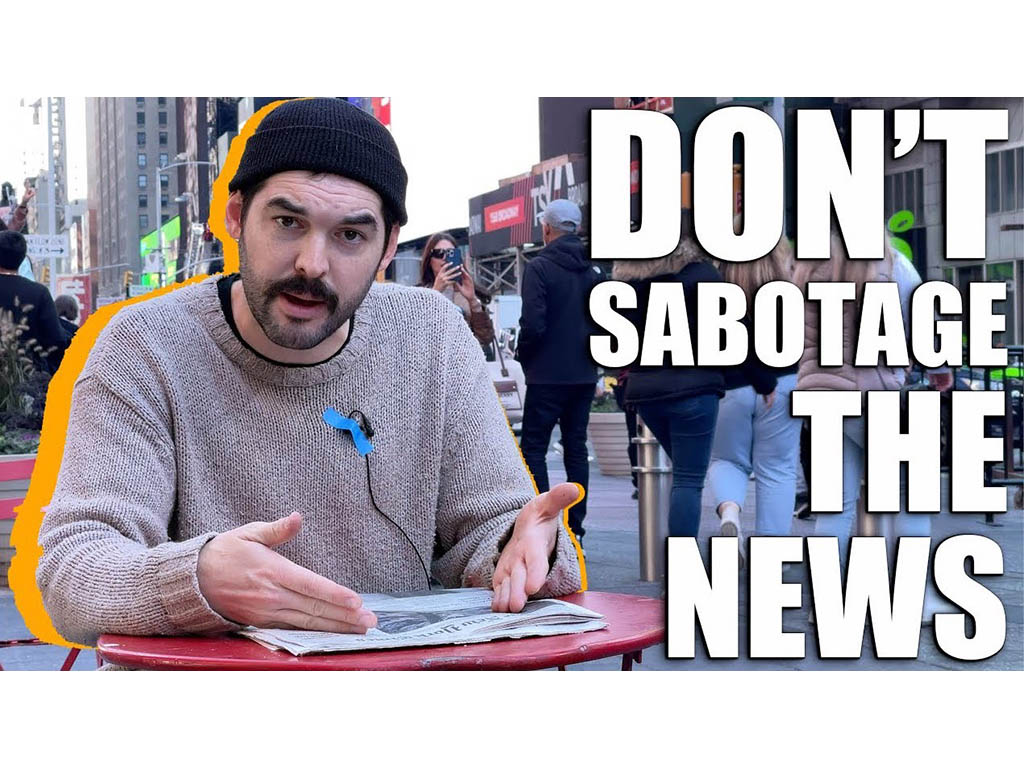July 11, 2023
Categories
Entertainment, Environment, Law & Justice, Media Criticism, Perspectives, World News
Tags
Share
(TEMPE, Ariz.) — “Whether you get your news online or you just love the feeling of paying a small child to wake up at 5 a.m. to throw trash at your house,” deadpans Rollie Williams while pointing to a blue, plastic-wrapped newspaper in the opening of a recent “Climate Town” YouTube video, “one thing has become extremely clear over the past 10 years, there’s a lot more news about the impressive variety of ways people are destroying the environment.”
Strolling through Times Square with the newspaper, Williams continues: “[The] undefeated heavyweight champions of going hog-wild on the planet” are fossil fuel companies. We know this, he says, because journalists from around the world are always writing about fossil fuel companies polluting the planet. Much like they did with Big Tobacco.
Part educator, part comedian, Williams addresses climate change in his offbeat yet highly researched format. His videos may seem low-budget, but his analysis is not.
A recent grad from Columbia University, Williams has a degree in climate science and policy and uses his experience in comedy to make climate conversations interesting and palatable. He discusses what’s happening in the world of climate change. Unabashed about his advocacy for addressing climate change, Climate Town’s home page makes it clear Williams’ message is a call to action on climate change.
“We think if people like you and me talked about the climate crisis 10x more than we do now, we’d have a shot of solving this thing. We hope these videos will help that along,” Williams writes. He’s advocating for a cause, and his videos represent his viewpoint — raising public awareness about the need to act on climate change. This is the very definition of advocacy.
But it’s his adherence to the basics of journalism that qualifies his videos as advocacy journalism. Williams gathers, processes, and distributes news and information to the 450,000 or so subscribers of Climate Town. And many love how he is approaching the problem of climate change. One viewer, Lilly Kane, wrote that she appreciates his inclusion of actionable and concrete solutions, adding that many others only point out problems.
But Williams points out that the problem suggests a solution to act on right now. This does wonders for her anxiety, she writes. Now, instead of feeling helpless in a world full of climate problems, she said she feels empowered to make a change.
Williams also follows the ethics of journalism with solid, fact-based, well-sourced reporting and holds those in power accountable. Specifically, he says fixing climate change won’t happen “with a quiet little choice at the grocery store” but that it takes governments and corporations to start taking real action. To hold them accountable, he points out the greenwashing that many corporations engage in.
That includes big media giants like The New York Times and others. He calls attention to advertorial writing paid by major fossil fuel companies that end up in these news giants’ publications as journalism, for example. If journalism’s first priority is to the truth and “a professional discipline of assembling and verifying facts,” according to “The Elements of Journalism,” Williams is doing just that. He’s also making it more approachable through his comedy.


